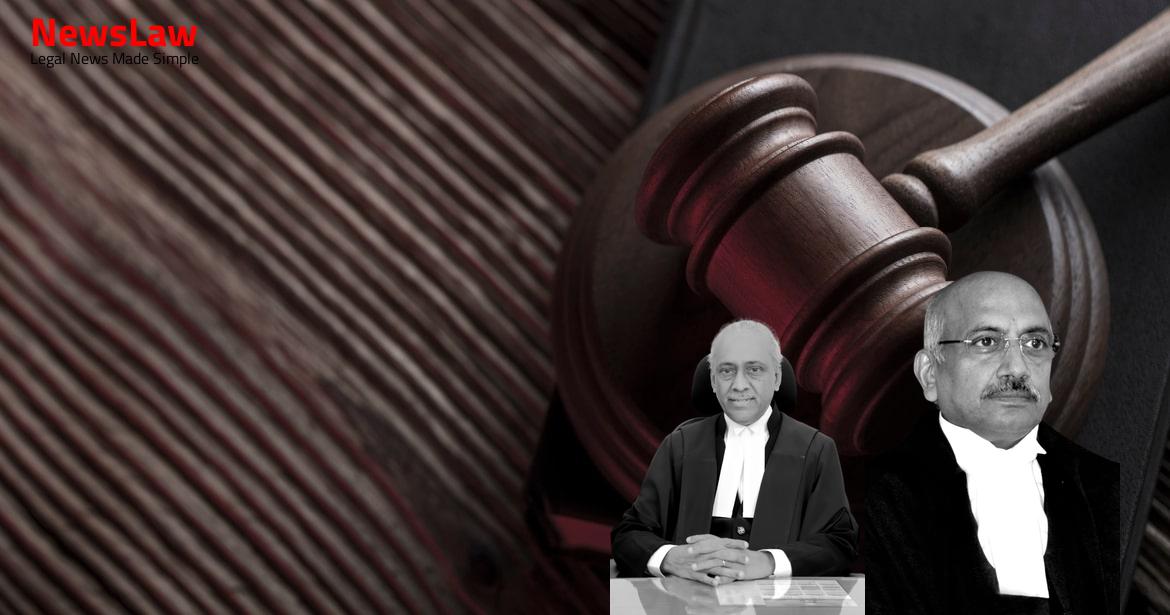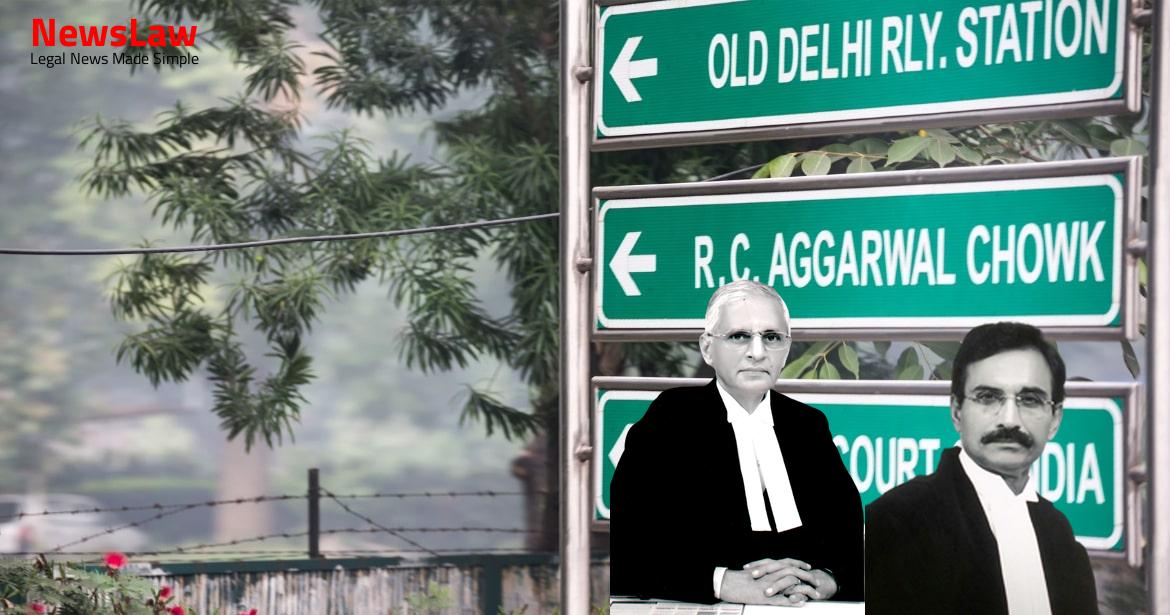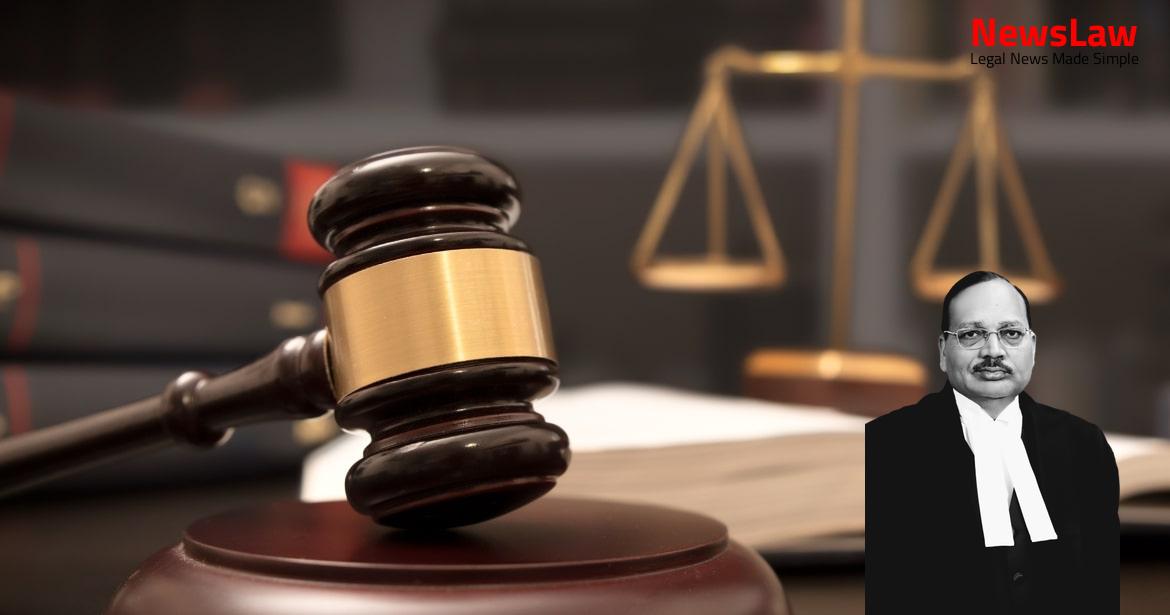Explore the significance of the court’s legal analysis in ensuring compliance with registration procedures. The case delves into the complexities of the Registration Act, highlighting the necessity for strict adherence to legal mandates. With a focus on upholding statutory duties and the role of authorities in registration processes, this case sheds light on the importance of judicial review in maintaining legal clarity and procedural adherence. Stay tuned for a deeper dive into the court’s crucial role in safeguarding against negligent or unauthorized registrations.
Facts
- Indian Bank sanctioned financial facilities to M.V.R. Group of Industries in 1992.
- A deed of Power of Attorney (PoA) was registered in the office of the Sub-Registrar, Alandur in 1995-96.
- After default in repayment, Indian Bank filed an application before the Debts Recovery Tribunal in 1996 under Section 19 of Recovery of Debts Due to Banks and Financial Institutions Act, 1993.
- Indian Bank issued a demand notice in 2004 under Section 13(2) of the Securitisation Act, followed by a possession notice in 2005 under Section 13(4).
- Respondent nos. 4 and 5 executed a PoA in favor of Mr. S.P. Velayutham in 2006.
- A deed of settlement was executed in 2008 between Mr. Amar and Mr. S.P. Velayutham.
- Proceedings under Section 145 Cr.P.C. were initiated due to encroachments during 2009-2015.
Also Read: Undisclosed Conviction for Dharna Under Police Act Leads to Overturned Election
Arguments
- Asset Reconstruction Company (India) Limited has filed appeals against the judgment of the Division Bench of the High Court of Judicature at Madras.
- The Division Bench reversed the judgment of the Single Judge who had declared the registration of a sale-deed as null and void.
- The appellant, represented by senior counsel, is challenging the decision of the High Court.
- Thansingh Nathmal vs Superintendent of Taxes is cited as support
- Sarvepalli Ramaiah vs. District Collector is cited as support
- Latif Estate Line India Ltd. vs. Hadeeja Ammal is cited as support
Also Read: Critical Analysis of Legal Principles in a High-Profile Criminal Case
Analysis
- The Registration Act, 1908, mandates strict compliance with its provisions.
- The distinction between authentication and registration is crucial in interpreting the Act.
- The role of the Registering Officer falls within a prescribed template provided by the Act.
- The judiciary upholds the duty of statutory authorities to act within the boundaries of the law.
- The authority’s failure to adhere to legal mandates can warrant judicial intervention through writ jurisdiction.
- The High Court can review the Registrar’s actions for compliance with statutory duties.
- Challenges to execution of documents and title disputes are pertinent to civil court jurisdiction.
- Writ jurisdiction under Article 226 is invoked to ensure proper legal adherence by authorities.
- The power of attorney agent presenting a document carries the legitimacy of the principal.
- Sections 32 and 33 of the Act outline the authority of agents in presenting documents for registration.
- The Registering Officer is obligated to verify the authenticity of agents and their authority.
- The Act’s scheme includes provisions concerning the presentation and registration of documents.
- The High Court’s writ jurisdiction addresses failures of statutory authorities to follow legal mandates.
- The Act devolves certain registration powers to State amendments.
- Authentication and registration requirements depend on specific State rules.
- Provisions of Section 33 are invoked in cases of agent representation during registration.
- The importance of complying with Section 34(3) requirements is highlighted.
- The High Court examines failures of Registering Authorities to adhere to legal mandates.
- Legal clarity is maintained by distinguishing between authentication and registration processes.
- The Act’s provisions are crucial in guarding against negligent or unauthorized registrations.
- Judicial scrutiny ensures Registering Authorities adhere to legal obligations.
- The Act’s provisions underscore the need for strict compliance and procedural adherence.
- Reviewing the Registering Authorities’ actions ensures the proper execution of legal duties.
- Judicial intervention through writ jurisdiction is necessary to address failures in legal compliance by authorities.
- The case of Amarnath vs. Gian Chand dealt with the acceptance of a deed of cancellation of sale for registration.
- The decision in Satya Pal Anand involved the cancellation of an allotment made by a cooperative society through a deed of extinguishment.
- Section 32(c) read with Sections 33 and 34(2)(c) are inter-related and do not apply when a power of attorney holder is also the executant of the document presented for registration.
- The court in Rajni Tandon distinguished the case of Thota Ganga Laxmi based on the absence of a similar rule in the State of Madhya Pradesh.
- Rulings in Sarvepalli Ramaiah and Thota Ganga Laxmi were considered in the context of acceptance of unilateral cancellations for registration.
- When notice of revocation of a power of attorney is given to a registering officer, he must inform other specified offices.
- Copies of decrees or orders are not included in the revocation process.
- Endorsements must be made on powers of attorney presented for registration, specifying details of the document and its connection.
- Section 34 of the Act outlines the inquiry process before registration by a registering officer.
- Enquiry under Section 34 includes verification of document execution, identity of persons, and rights of representatives.
- Different persons authorized to authenticate powers of attorney: Registrar, Sub-Registrar, Magistrate, Notary Public, etc.
- Provisions under Section 33 specify the types of powers of attorney recognized for registration purposes.
- Rule 52 dictates the duties of a Registering Officer, including retaining abstracts of authenticated powers of attorney and maintaining records of revocations.
- Explanation of authentication vs. registration provided to individuals presenting powers of attorney.
- Rules 46, 48, and 49 elaborate on the procedures for documents presented under general or special powers of attorney.
- Requirements under Rules 48 and 49 for presenting documents for authentication, registration, or both.
- Section 32 mandates who can present documents for registration under the Act.
- Procedures under Sections 34B and 64-A for registration of powers of attorney relating to immovable property.
- The Division bench of the High Court was not correct in setting aside the order of the learned single Judge.
- The recourse to civil court should not be viewed as the only solution for all issues.
- If the Registering Officer is seen as merely executing a mechanical role without independent judgment, it opens the door for fraudulent practices like selling government properties and registering documents by unscrupulous individuals.
Also Read: Legal Analysis on Specific Performance Obligations in Land Sale Agreement
Decision
- The appeals have been allowed.
- The impugned order of the Division Bench has been set aside.
- The order of the learned single Judge has been restored.
- There will be no order as to costs.
Case Title: ASSET RECONSTRUCTION COMPANY (INDIA) LIMITED Vs. S.P. VELAYUTHAM (2022 INSC 509)
Case Number: C.A. No.-002752-002753 / 2022



